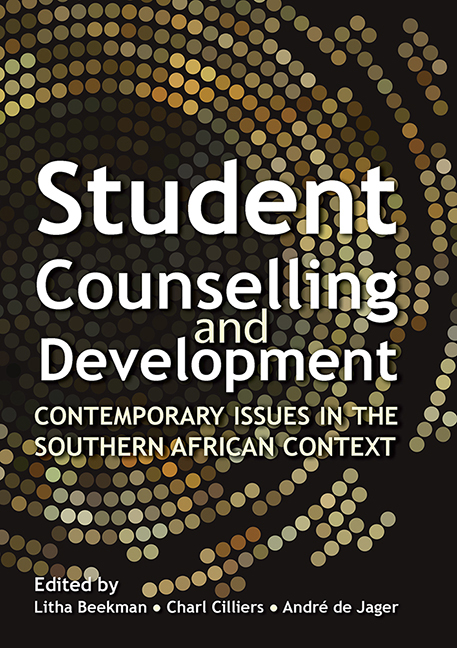 Student Counseling and Development in the South African Context
Student Counseling and Development in the South African Context Book contents
- Frontmatter
- Contents
- Figures
- Tables
- Preface
- Section 1 Development of Student Counselling and Development in Southern Africa
- Section 2 Theoretical Foundations of Student Counselling and Development in Higher Education
- Section 3 Services and Programmes Provided by Student Counselling and Development Units
- Section 4 Student Counselling and Development For Special Groups
- Section 5 Quality Assurance and Ethical and Professional Issues
- Contributors
- Index
Section 3 - Services and Programmes Provided by Student Counselling and Development Units
Published online by Cambridge University Press: 22 February 2020
- Frontmatter
- Contents
- Figures
- Tables
- Preface
- Section 1 Development of Student Counselling and Development in Southern Africa
- Section 2 Theoretical Foundations of Student Counselling and Development in Higher Education
- Section 3 Services and Programmes Provided by Student Counselling and Development Units
- Section 4 Student Counselling and Development For Special Groups
- Section 5 Quality Assurance and Ethical and Professional Issues
- Contributors
- Index
Summary
The definition, scope and objectives of Student Counselling and Development (SCD) and the role of student counsellors have been described in Section 1 and 2. The role of student counsellors is, firstly, to support the holistic growth and development of students, secondly, to enhance learning skills, and thirdly, to provide guidance, counselling and/or therapy. These core roles and competences are translated into services and programmes that provide assistance to students at higher education (HE) institutions. The aspect of HIV/AIDS counselling is not included as a separate chapter in this book because most of the time it is dealt with in health and wellness units or centres where medical and nursing services are provided. HIV/AIDS positive students are accommodated in the different student counselling services and special assistance is given in the form of counselling before and after testing, therapy to deal with a positive status and lifestyle design, and academic assistance for those who experience setbacks during the academic term. The cooperative working relationship between the SCD and other services at HE institutions has been illustrated in Section 2, where all the sub-systems, such as SCD and other support services in the HE micro-system, work together to improve the wellness of all students.
Counselling and therapy form the foundation for Sections 3 and 4, where the focus is on different programmes or services rendered by student counsellors. Chapter 7 provides an overview of selected theories for counselling and therapy to set the stage for the rest of Sections 3 and 4. This chapter was included at the specific request of student counsellors, such as counselling interns and other professionals who are not registered psychologists. These theories are applicable to all student counsellors because personal issues are intertwined with other issues such as career decision making, academic performance and adaptation to HE. Student counsellors should use the foundation of these theories together with the domain-specific theories to provide assistance to students and by doing so cover the full array of students’ concerns, challenges and problems. Trends in Western theory development in psychotherapy and counselling, up to the constructivist approach of the postmodernist era, are discussed whereafter the chapter proceeds to highlight the skills needed for crisis and group counselling.
- Type
- Chapter
- Information
- Student Counseling and Development in the South African ContextContemporary issuesin the Southern African Context, pp. 129 - 131Publisher: University of South AfricaPrint publication year: 2012
